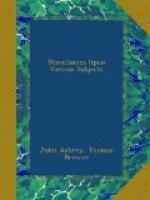Ibid. Galeni “tria Somnia".—– “Tertium magis dignum miraculo, cum bis per somnium admonitus, ut arteriam secaret, quae inter pollicem & indicem est, idque agens liberatus sit a diuturno dolore, quo infestabatur ea in parte, qua septo transverso jecur jungitur, idque in libri de sectione venae fine testatus est. Magno certe exemplo, quod tantus vir in medicina eam adhibuerit somnio fidem, ut in seipso periculum vitae subierit, in arte propria. Deinde probitatem admiror, ut quo potuerit solertia ingenii sibi inventum ascribere, Deo cui debebatur, rediderit. Dignus vel hoc solo vir immortalitate nominis, & librorum suorum.”
Galen’s three dreams. The third more worthy of being called a miracle, was, when being twice admonished in his sleep, to cut the artery that lies between the fore finger and the thumb, and doing it accordingly, he was freed from a continual daily pain with which he was afflicted in that part where the liver is joined to the midriff; and this he has testified at the end of his book of Venesection. ’Tis certainly a very great example, when a man so great as he was in the medicinal art, put so much confidence in a dream as to try experiments upon himself; where he was to run the risque of his life, in his own very art. I cannot help but admire his probity in the next place, that where he might have arrogated the merit of the invention to himself, and placed it wholly to the account of the subtility and penetration of his own genius, he attributed it to God, to whom it was due. In this alone did the man well deserve to purchase an immortality to his name and his writings.
In his fourth book, chap. 4. “De Exemplis propriis”, he owns the solution of some difficult problems in Algebra to his dreams.
Plinii, Nat. Hist. lib. 22, chap. 17. “Verna carus Pericli Atheniensium Principi, cum is in arce templum aedificaret, repsissetque super altitudinem fastigii, & inde cecidisset, hac herba (Parthenio) dicitur sanatus, monstrata Pericli somnio a Minerva. Quare Parthenium vocari coepta est, assignaturque ei Deae.”
Pliny’s Natural History, book 22, chap. 17. “A little Home-bred Slave, that was a darling favourite to Pericles, Prince of the Athenians, and who, while a temple was building in the Prince’s palace, had climbed up to the very top of the pinnacle, and tumbled down from that prodigious height; is said to have been cured of his fall by the herb Parthenium, or mug-wort, which was shown to Pericles in a dream, by Minerva. From hence it originally took the name of Parthenium, and is attributed to that Goddess.
“Augustinus, Cui etiam praeter sanctitatem, plena fides adhiberi potest, duo narrat inter reliqua somnia admiranda. Primum, quod cum quidam mortuo nuper patre venaretur tanquam de pecunia quam pater illi ex chirographo debuisset, dum incastus viveret, hac causa nocte quadam umbram patris videt, quae illum admonuit de persoluta pecunia & ubi chirographum esset repositum. Cum surrexisset, invenit chirographum loco eo quem umbra paterna docuerat, liberatusque est ab injusto petitore.”




